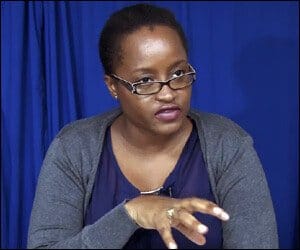
Director of Community Affairs Azilla Clarke
Basseterre, St. Kitts – Nevis
May 29, 2015 (SKNIS)
The St. Kitts – Nevis National Household Registry has commenced a survey as part of a process designed to determine which segments of the population can effectively use the services provided for the vulnerable in society.
The survey, which began today (May 26) in the Parish of St. Paul will be island-wide and the responses will be private and confidential and for use only by the National Household Registry which falls under the Ministry inclusive of Community Development, Gender Affairs, and Social Services.
Registry Operations Manager Andrea Douglas encouraged participation.
“I know persons don’t generally like to give personal information but this information that we are gathering is really to help you,” she emphasized. “It’s helping us so that we can find out who “¦ would make the most effective use of government services. By answering these questions, it is helping us to help you and help the community.”
“They will come to the household, dressed in a cap carrying the Registry’s logo, a vest and their ID with their name,” Ms. Douglas outlined. “They’ll come to that household and ask for the head of the household. They’ll then request an ID from the head of the household, specifically the social security card. After this they will give a brief description of the questions they will be asking. Once they get the responses, they put them into their I-Pads which would go straight to the Registry’s Office. Householders will then be given a brochure and a receipt and then at the very end, they’ll ask the permission of the household to put a sticker on their house.”
She explained that the sticker will allow other enumerators to see that the family living in that house was already interviewed.
Director of Community Affairs Azilla Clarke further detailed the process.
“We are coming to the most identified areas in all of the parishes, to those households, in order to get from them a description of their household based on some characteristics that we know,” she revealed. “Then that information will be entered in a system and then from that registry or database we will be able to apply the test [proxy means test]. From that population of households, we will be able to classify individual households and once we’ve classified them, we will know where we need to target our services.”
The classification consists of four categories of indigent, poor, vulnerable or non-vulnerable. According to Ms. Clarke a proxy means test is a calculation of characteristics of households, in a particular country, ie whether the household is headed by a male or female, the number of children, the standard of education and “you put a weight to those and depending on your calculated score you can then know whether you or your household is poor, vulnerable, indigent or not poor at all.” The proxy means test for the Federation was created by using the 2007-2008 Poverty Assessment.
Ms. Clarke explained that the activities fall under the Social Protection Strategy. This would include social welfare programmes provided at Social Services along with those provided by the Social Security Board such as the social assistance pension, the Labour Department’s employment schemes along with programmes such as Youth Experiencing Success (YES), the People Employment Programme (PEP) and the Short-Term Experience Programme. She noted that there were also programmes organized by Faith-Based Organizations (FBOs) and other societal organizations.
“When we look at the mixture and cross-cutting of these, they all intersect in order to create social protection programs because the objective is to protect those that are most at risk for vulnerabilities or are classified as poor.” Ms. Clarke explained. “It goes into outlining the plans that the government of St. Kitts and Nevis, through the Ministry must undertake in order to better serve that population.€
The Ministry is being assisted by Consultant Andres Chamba who explained that even after the information is compiled, if families are not satisfied with their classification they can ask for a revision.”
After we notify households of their category, in the four welfare categories, they have the right to appeal,” Mr. Chamba explained. “We may have made some mistakes during data collection, families may reconsider. In this appeal process we will again collect information from the household, run a new scientific formula more specific to the reality of 2015 data and reclassify the household according to the same four welfare categories, if there is a change. It is possible that a family can fall in the same welfare category or maybe the family can move to another category. We will notify the household about the result of this appeal, but this is final and conclusive, there is a one-time appeal.”